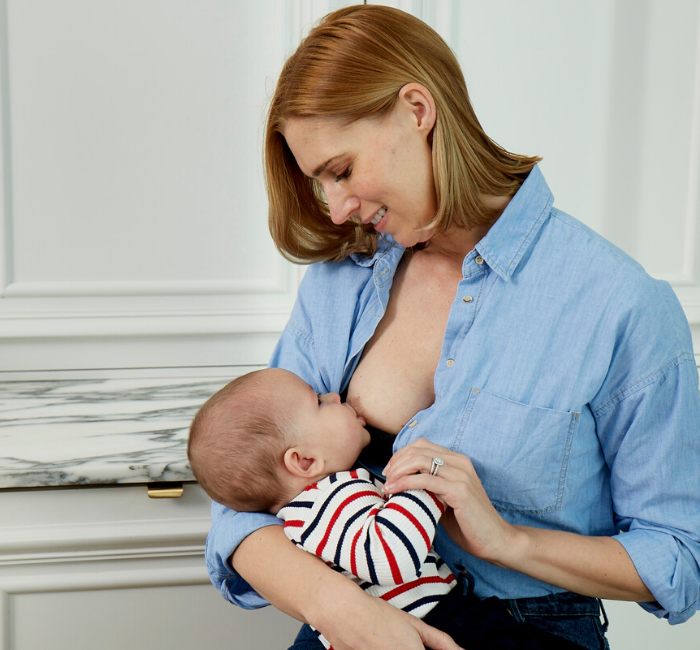The Benefits of Breastfeeding for Baby and Mum
As a mum-to-be you’ve no doubt started thinking about how you’ll feed your baby. In this article we talk through the benefits of breastfeeding for your baby, and the effects it can have on your body too.
Why is Breastfeeding Good for Baby?
The reason there are so many posters at doctor’s surgeries and hospitals promoting breastfeeding is because breastmilk is considered to be the best source of nutrition for your baby.
What you may not realise is that as well as all of the nutrients your baby needs (which includes fat, carbohydrates, protein, vitamins, minerals and water), breastmilk contains compounds that scientists have dubbed “anti-infective factors”.
These are naturally occurring substances in breastmilk which protect your baby from infections that affect the tummy, airways and ears. Although manufacturers try to replicate breast milk, none of these “factors” are found in formula milk, and it can’t protect your baby against infections.
Breastfeeding reduces your baby’s risk of diarrhoea and vomiting, ear infections, asthma, eczema, pneumonia, Sudden Infant Death Syndrome, obesity, type 1 and type 2 diabetes, and childhood leukaemia, as well as cardiovascular disease in later life.
Why is Breastfeeding Good for Mothers?

During breastfeeding (and skin-to-skin contact) a hormone known as oxytocin is released in both yours and your baby’s brain. The release of oxytocin can lower feelings of anxiety, and induce a sense of calm. It can also help you to feel more emotionally connected to your baby.
Not only that, but statistics show that mums who breastfeed actually sleep better. Although this sounds counter-intuitive (getting up for night feeds is a recipe for broken sleep!) breastfeeding actually stimulates the release of prolactin, another hormone which can help you to feel relaxed and sleepy. This means even if you are getting up to feed, you’re more likely to fall back to sleep.
There’s also strong evidence that breastfeeding can protect you against breast cancer and improve birth spacing (how quickly you become pregnant again). Breastfeeding also protects you against ovarian cancer, osteoporosis, cardiovascular disease, obesity and type 2 diabetes.
Can Breastfeeding Help with Weight Loss?
It’s true that breastfeeding means you’ll use more calories than normal – around 200-500 extra per day. Although there are many factors involved in weight loss, if these extra calories are provided by the fat stores laid down during pregnancy, breastfeeding may help you return to your pre-pregnancy weight more easily.
Will Breastfeeding Affect My Boobs?
A common reason for not breastfeeding is the concern that breastfeeding will affect the appearance of your boobs. Interestingly enough, researchers looking into the effect of breastfeeding on breast shape and volume and have found that breastfeeding itself doesn’t have a negative impact on the appearance of your breasts.
What can affect breast shape and volume is pregnancy itself. During pregnancy, the ligaments that support your breasts can stretch which can change their appearance – which is why wearing a well fitting bra during pregnancy is recommended!
Other factors thought to play a role in changes in breast appearance include the number of previous pregnancies, your age, body weight and whether you smoke, as these can all affect the elasticity of skin.
What If I Find Breastfeeding Challenging?
Whilst it’s true that breastfeeding has great benefits for you and your baby, and over 95% of women are physiologically capable of producing all the milk their baby needs, it’s not unusual for new mothers to find establishing breastfeeding challenging. Some babies have difficulty latching on, some mothers experience dry or cracked nipples that may make feeding very painful, and about 1 in 10 babies suffer with tongue tie, which can make it harder to feed.
You may or may not experience some of these things, but if you do, it’s important to ask for support as soon as possible – your midwife, health visitor or a Breastfeeding Counsellor or an IBCLC Lactation Consultant can help.
In most cases, breastfeeding challenges can be resolved with the right support, but if you aren’t able to continue breastfeeding, keep the big picture in mind… the most important thing is that your baby is happy and you are enjoying your time together. There are many ways to bond with your baby outside of breastfeeding, and health is affected by many factors beyond breastfeeding.
For evidence re ovarian cancer and type 2 diabetes please see:
Research on Ovarian cancer – Baby Friendly Initiative
Breastfeeding for six months slashes type 2 diabetes risk by 47 per cent, study shows

